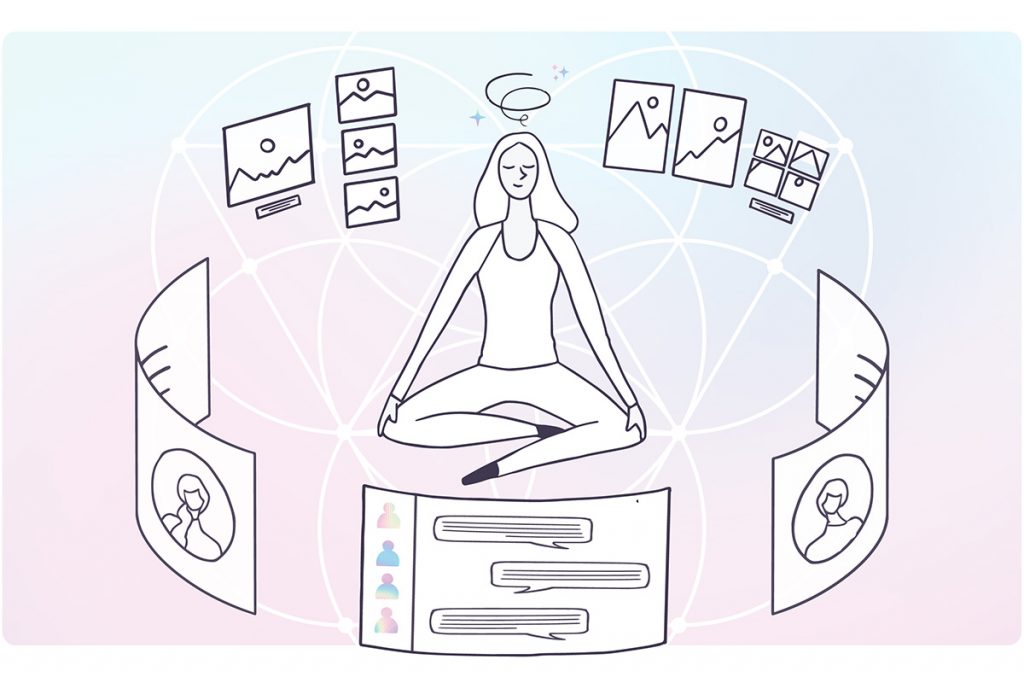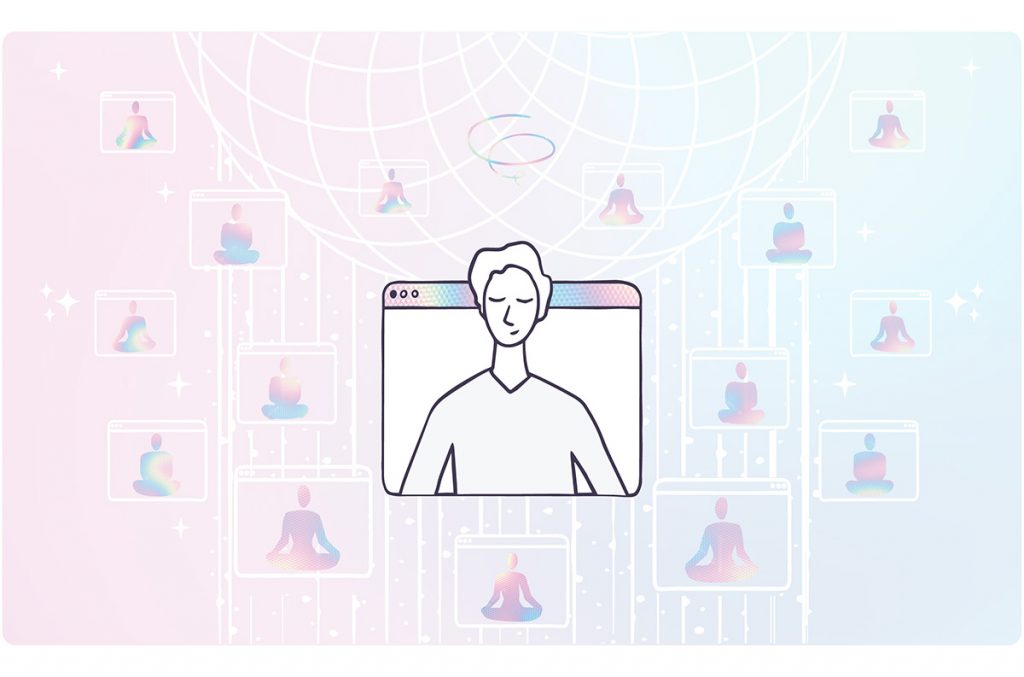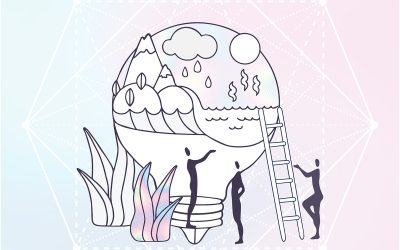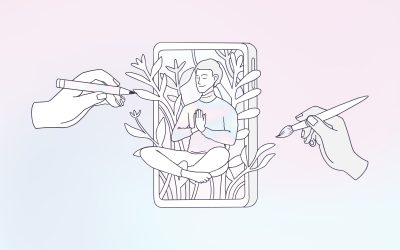Iain Verigin creates online spaces on the Sutra platform for his local meditation group and several meditation centers. He designs spaces that are clean, organized, and easy to navigate. Discussion and content spaces are the main features Iain uses in his program spaces; these private spaces hold links to Zoom meetings and meditations, and offer a private place for conversation among participants. For art-based meditation programs, participants have the ability to upload photos of their artwork for sharing and discussing. An additional feature that Iain sets up for the teachers and meditation centers he’s supporting is the broadcast feature which streamlines emails to program participants.
Iain is someone for whom meditation has been deeply impactful. From this place of personal experience, and with a background in business and entrepreneurial professorship, he volunteers his IT expertise to spiritual communities setting up online meditation programs. He began setting up simple groups and events, and is now assisting in the creation of ongoing, private spaces that build community.

From sharing books to sharing artwork in online, art-based meditation retreats
Iain says that his work on Sutra has been an evolution. His initial experience on Sutra was with Meg Wheatley’s Warriors for the Human Spirit program and, from this experience, he understood the potential for supporting online communities on Sutra. As a member of several spiritual communities, Iain was increasingly aware of people looking for private, online spaces that were not Facebook. His first project to test Sutra was setting up an online book club, which worked very well.
Then, with the arrival of Covid, Iain’s meditation community could no longer go to their retreat center. They began meeting weekly for Zoom meditations; eventually, they met several times a week. Maintaining multiple Zoom links became cumbersome with email, so Iain set up a private group space on Sutra which made it easy for everyone to access links.
Around the same time, Iain became aware that online retreats need the capability to do more than simply share Zoom links. In particular, art-based meditation retreats require the ability for participants to post images of their artwork as well as hold discussion around those images. He knew Sutra could support these needs. In a volunteer capacity, Iain began offering his IT skills beyond his local meditation group; two meditation centers that he supported—and continues to support—are The Dharma Centre of Canada and the Wangapeka Study and Retreat Centre in New Zealand.
Because the Sutra platform allows participants to upload personal photos, it works particularly well for the art-based retreats that Iain supports. These retreats, which might explore the colors of human emotion or tarot, vary in format but involve such elements as shared time on Zoom; personal time to create art at home; private, online discussion spaces to share art and dialogue; and Q&A sessions. Integrating and exploring these elements of art-based retreats on Sutra has been very successful.
Building connection in online spaces
While many organizations focus on email marketing and community apps like Slack or Teams, Iain encourages the groups he supports to focus their community-building efforts on the Sutra platform. With links for Zoom calls, private discussion spaces for dialogue, and content spaces for informational materials, retreat organizers can not only house event information all in one place but can also build connection within their core communities. Moving beyond emails, there is potential for meditation communities to engage in ongoing conversations between retreats in a private, shared online space. There is no lull between events; there is continued connection.
In a recent online meditation event, Iain helped to coordinate a group of approximately 80 participants. Led by five different teachers, the event coordinated communities from New Zealand, Western Canada, Eastern Canada, Europe, and the United States. Hosted on Sutra as a free event, it was an opportunity to bring together several different communities to practice together. It was as much an exercise in the inward work of meditation as the outward expansion of building community. The event was a success, and similar meditation gatherings will likely continue, says Iain.
The power of Sutra’s streamlined features
Many of the people participating in the online meditation retreats that Iain supports are people over the age of 60. As such, they are not digital natives and it is critical that the structures Iain creates on Sutra are clear and simple, allowing participants to navigate with ease. In a typical online retreat space, Iain sets up two main spaces: one for community discussion and one for the teacher to post Zoom links, special instructions, and any additional information.
Iain has found that mobile-based apps like WhatsApp often involve complicated features and discussion threads that are hard to follow. While participants of the programs he supports use the Sutra app for convenience when traveling or away from home, the majority move through the online retreat experience using a desktop or laptop. As for discussion threads, a Sutra feature that potentially enriches the discussion experience is the harvesting feature; this allows both teachers and participants to create color-coded tags that organize comments into relevant categories for easy sharing and revisiting.

On the Sutra platform, Iain has the ability to set up spaces that are easy to navigate and pleasing to view. Participants of these online programs access everything that supports their meditation practice in one private place; the experience is streamlined, clean, and spacious.
Is it possible to meditate online?
Iain has a private space for his local meditation group on Sutra. Members handle all of their communication within that space, maintain links to weekly and monthly meetings, as well as create retreats for their group. It’s become a pleasant and efficient way to support each other in their meditation practice.
Online engagement for Iain’s meditation group is strong but this wasn’t always the case. In the early stages of the pandemic, many members resisted Zoom and online meditation, feeling that meditation could only be done live, in person. However, as the pandemic dragged on, they gave it a chance. That was the biggest hurdle, says Iain, just getting members onto Zoom. Once they learned how to use Zoom, moving everyone onto the Sutra platform was easy. For his meditation group, Iain set up a discussion space where conversation remains active, and a content space that holds Zoom links for meditation sessions and retreats. As with all the spiritual programs Iain supports, the space he created for his local group is intentionally clean and simple, an aesthetic that reflects the intention of his group’s meditation work.

When the online experience is even better than in-person
Iain has seen great success for online, art-based meditation retreats thanks to participants’ ability to upload and share photos. In some ways, hosting art-based retreats online is even better than hosting them in-person, he explains. Because of the number of participants, it becomes a logistical question, when in-person, of having enough physical space to share everyone’s artwork, as well as having ample time to view and discuss the artwork. When hosting art-based retreats online, Ian creates discussion spaces where participants can upload photos of their work; then, participants have ample time throughout the course of the retreat—sometimes extending over a weekend, sometimes extending over several weeks—to view each other’s work and to dialogue with one another.
For many, online meditation gatherings are new; Iain sees potential in this community experience. When meditating in-person, there is an energy that exists in that space of community. Iain has sensed a similar energy online. It is an energy, he says, that is different than when meditating alone.

Meaningful conversation in safe online spaces
The ability for meditation groups and retreat centers to host events, share resources, and build community within safe, private spaces online is important. Iain notes that groups often begin with emails but, if there’s going to be meaningful conversation in groups larger than ten (or so) individuals, a private online space becomes crucial. Email is one-sided; conversation within the discussion spaces created on Sutra are multi-dimensional. People are looking for safe places to share, safe places to learn, safe places to gather online. Sutra helps Iain create these safe spaces as he volunteers his support of spiritual communities expanding online programs.
What’s next?
There is, perhaps, a delicate balance between engaging in solitary, inward work while also engaging in community. It is not a case of one being more important than the other so much as it is a distinction. Alone, together, or a nuanced combination—all are moving toward the same goal. Creating online spaces for people to practice meditation and to engage in dialogue between meditation sessions is something to which Iain devotes and volunteers time and attention. He appreciates that online programs allow people who don’t have the means to travel, whether because of time or financial constraints, to experience meditation retreats. Moving forward, Iain believes much retreating will continue online; he sees online work as an integral part of the future of the meditation communities he supports. He plans to continue volunteering his IT skills in this regard.



